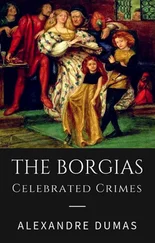As Lord of Imola, Castel Bolognese, Faenza, Forlì, Cesena, Rimini, and Pesaro, Cesare was now the ruler of a substantial state that stretched seventy-five miles down the Via Emilia from Bologna to the Adriatic coast. And in May his father, the pope, invested him with the title of Lord of the Romagna. He had achieved his stated goal as captain-general of the church of returning the fiefs that had belonged to the excommunicated vicars to papal rule, and slightly exceeded his man date with the capture of Castel Bolognese.
Alexander VI now ordered his son to return to Rome. It was soon clear, however, that Cesare had assumed a new importance in his own eyes. Acting independently of the pope, and in a way that was directly contrary to his father’s wishes, Cesare now turned his attention to Florence. He was aware of the need for speed: Yves d’Alègre and the other French troops would soon be obliged to leave him to join the French army that was massing at Parma for Louis XII’s campaign against Naples.
Florence’s republican government was seriously alarmed. ‘From all parts come reports of the ill intentions of the Pope and the Duke, who intend to attack us and change our constitution,’ the Florentine representative in France, Machiavelli, was told. The Florentines were only too aware that Cesare would have ‘such confidence in his fortune that every undertaking, even the most difficult, seems easy to him.’ And they worried about the motives of several of Cesare’s captains, whom they described as ‘most inimical to our city.’ Paolo Orsini, for example, had close links with the exiled and detested Medici family; or Vitellozzo Vitelli, who had sworn publicly to take revenge on the Florentines for executing his brother Paolo.
In the city itself, fear of Cesare had caused ‘the greatest disorder,’ so Biagio Buonaccorsi said; many citizens had fled their homes, he added, and ‘appeals were made to the King [of France] who was too far away to be of any help in so urgent a matter; the King did write letters to the Duke, but none of them was obeyed and everything was in suspense and great tumult.’
By May 2, five days after seizing Castel Bolognese, Cesare’s troops had crossed the Apennines and set up camp at Firenzuola, just thirty miles from Florence. His army approached the city slowly, taking every opportunity to destroy crops, burn barns, steal animals and food stores, even to cut the grain ripening in the fields. On May 13 the Florentine envoys met Cesare at Campi and, much to the relief of the city, negotiated a treaty of alliance with the bold invader, paying Cesare 36,000 ducats a year for the privilege. Buonaccorsi claimed that the Florentines had signed ‘merely to get Cesare off their backs,’ but the threat had been very real.
‘This lord is very proud,’ Machiavelli was to write later of Cesare, ‘and, as a soldier, he is so enterprising that nothing is so great that it does not seem trivial to him. And, for the sake of glory and of acquiring lands, he does not rest, and acknowledges no fatigue or danger. He arrives at one place before he is known to have left the other; he endears himself to his soldiers; he has got hold of the best men in Italy, and these factors, together with continual good fortune, make him victorious and dangerous.’
Cesare now withdrew his men to the Tuscan coast, allowing them to plunder indiscriminately on their way to their camp near Piombino, opposite the island of Elba, from where he was now in a position to threaten both Pisa and Siena. Cesare himself, however, had other obligations, not least his promise to assist in the French campaign to conquer Naples, and so, on June 27, he finally acceded to his father’s request and returned to Rome. He had reason to feel satisfied with himself and his achievements. At the age of twenty-five, the new Lord of the Romagna had become a force to command fear and respect in Italian affairs.
— CHAPTER 18 — The Naples Campaign
‘THEY KILLED WITHOUT PITY’
CESARE RETURNED TO ROME late in the evening of June 17, 1501, stealing in quietly through one of the smaller gates in his characteristically mysterious way, unobserved in the gathering dusk and in the general commotion caused by the vanguard of the French army, who had set up camp outside the city walls the day before.
The soldiers had left a trail of destruction behind them as they had marched through central Italy. The Florentine diarist Luca Landucci reported as many as thirty thousand troops ‘doing many wicked things: they cut crops for their horses wherever they went, plundered all the wine cellars, flogging anyone in their way; they respected neither the commissioners nor the people; they killed the peasants who tried to stop them from taking their hens and in one fight they killed twenty men.’ On hearing the news that the French had arrived in Rome, Landucci exclaimed with compassion, ‘Just think what it is like in Rome.’
The French army of fourteen thousand men had been provided with meat, bread, and wine, and a camp had been established for them outside the walls of Rome. They had, additionally, so Burchard said, been provided with the services of the very inadequate number of sixteen prostitutes. Burchard also said that the Florentine merchants in Rome had bribed the city governor with a generous sum of ducats to avoid having senior French officers billeted in their houses; the French were billeted on them anyway, and the governor kept the money.
Their commander, Robert Stuart, Lord d’Aubigny, a Scot by birth, arrived in Rome on June 23 and was received at the gate of Santa Maria del Popolo by Jofrè, who escorted the Frenchman to the Vatican. The pope greeted his guest, and, so the French chronicler Jean d’Auton observed, ‘dissimulated his feelings with a joyous countenance.’ Alexander VI, ‘despite the fact that he was Spanish and no friend of the French,’ continued the chronicler, ‘received the captains of the French army, and talked merrily with them on various subjects.’ He handed out lavish presents to all; d’Aubigny received a great grey charger, ‘with harness so splendid that everyone was amazed by it.’
That evening Cardinal Sanseverino, the brother of the commander of the Italian troops, entertained the French officers at ‘a magnificent banquet,’ which was held in the gardens of Cardinal Ascanio Sforza’s villa, ‘in which there were groves of orange and lemon trees and pomegranates as well as other fruit trees and flowers of all kinds and scents, and singers, jugglers, tragedians and comedians all exercised their art in turn.’
The French army left Rome on June 28, after marching past Castel Sant’Angelo. From his position high on the balcony, Alexander VI watched the parade of 12,000 infantry, 2,000 cavalry, and 26 carriages laden with artillery, observing, so it was said, ‘the departure of these soldiers with great joy.’ Also in the parade was Cesare, seen in public for the first time since his secret return ten days earlier.
The following day Lord d’Aubigny went to the Vatican, where he was closeted for some time with the pope, who told his visitor the news that, in a secret consistory held a few days earlier, he had formally dispossessed Federigo of Aragon of the kingdom of Naples and bestowed it instead on the king of France. After their private talks, d’Aubigny went to the Sala del Pappagallo, where, Burchard reported, ‘all the cardinals permitted him the honour of kissing them on the mouth,’ before taking his leave and rejoining his troops on the road south to Naples.
Despite taking part in the parade, Cesare himself did not leave Rome immediately, delaying his departure for several reasons. The formidable Caterina Sforza, weakened after spending nearly a year imprisoned in the dungeons of Castel Sant’Angelo, was finally persuaded to abandon her rights to Imola and Forlì, and she was released from gaol to spend the rest of her years in exile in Florence. More importantly, Cesare was waiting impatiently for his captain Vitellozzo Vitelli and his soldiers, who were on their way south from Tuscany, having taken the strategically important port of Piombino. Finally Cesare and his four hundred troops were ready to join the French army marching to Naples under the command of d’Aubigny.
Читать дальше











